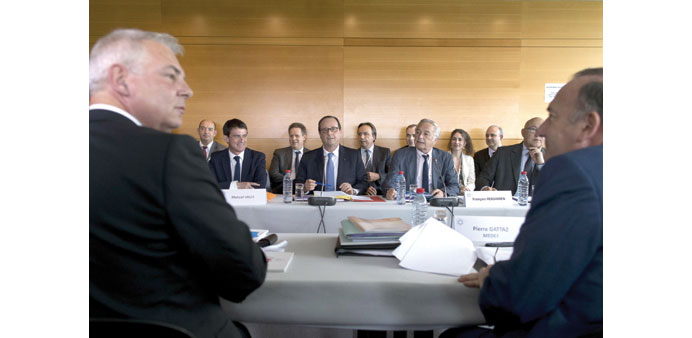CGT general secretary Thierry Lepaon (left) and Medef chief Pierre Gattaz (right) sit across from (left to right), Prime Minister Valls, President Hollande, Labour Minister Francois Rebsamen, and Finance Minister Michel Sapin (partially blocked by Gattaz) to attend a meeting for the opening of the Social Conference, a two-day conference to discuss economic reform plans with unions and workers.
Reuters/AFP
A government-hosted conference to bring workers and employers together to address record joblessness was boycotted by two unions yesterday, with the ruling Socialist Party blaming employer groups for the breakdown.
Prime Minister Manuel Valls said the two-day event should launch reforms, including greater use of apprenticeships, and simplify a 3,200-page labour code to ease rules on worker representation which firms say are too costly and complex.
But as the meeting opened yesterday, the large CGT and FO unions said they would not attend sessions today in protest at what they called unfair behaviour by employers that are set to receive an unprecedented €40bn ($55bn) in tax relief over the next three years.
The Medef employer group had agreed to set hiring targets in exchange for the easing in payroll taxes, but unions say they have not respected that pledge.
The unions’ complaint was supported by Jean-Christophe Cambadelis, head of Valls’ Socialist Party.
“Today our main problem is Medef’s attitude,” he told France Info radio, echoing government sources who criticised the employers’ group. “Their culture is ‘take the money and run’.”
Gerard Rodriguez, a senior official at the CGT, told Reuters that his union would neither attend a speech to be delivered by Valls, nor working sessions today that are the backbone of the consensus-building endeavour.
An FO official said his union would follow suit.
Last week it was Medef that threatened to boycott the meeting unless the government delayed the implementation of an early retirement scheme for workers in strenuous jobs.
It got the concession – a one-year delay until 2016 – but at the price of irking the unions and the government.
Participants said the talks would mostly focus on difficulties implementing past reforms, including President Francois Hollande’s “responsibility pact”, under which firms agreed to hiring targets in return for lower labour costs.
“The conference is less about moving ahead than ensuring what we already agreed can be implemented,” Philippe Louis, president of the reform-minded CFTC union, told Reuters.
Asked if he expected any breakthrough deals, he added: “No, we can feel that feet are firmly on the brake pedals.”
Companies have started to receive the tax breaks, but negotiations on how to apply the quid pro quo on hiring have barely got off the ground. Talks have only started in 10 industry sectors out of hundreds.
While Medef says the tax relief is coming too slowly, Laurent Berger of the moderate CFDT union argued it should be cut altogether in 2016 and 2017 unless employers live up to vows on investment and hiring.
Deutsche Bank economist Gilles Moec welcomed the move to cut employers’ costs, saying it could help firms more than income tax cuts being made by Italian Prime Minister Matteo Renzi.
But he doubted the reforms would result in more hiring.
“If the government thought for one second there was a reality behind the quid pro quos, it was mistaken,” Moec said of the hiring promises made by employer representatives when they signed the responsibility pact this year.
The summit comes against a backdrop of record unemployment in the eurozone’s second largest economy, with 3.38mn people out of work.
The high jobless figures were seen as a key factor behind humiliating election defeats for Hollande’s Socialists this year.

